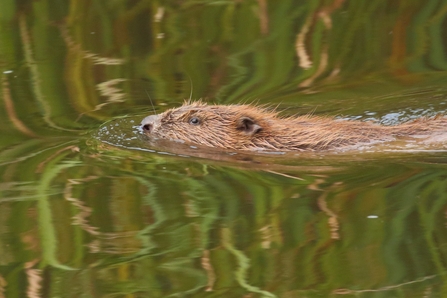
Female beaver © Mike Symes

Female beaver © Mike Symes
Defra has announced new legislation that will provide legal protections for beavers in England and could pave the way for the animals to be released into the wild under licence.
The Wildlife Trusts welcome the protections for “nature’s engineers”, calling for sensible management guidance and incentives for landowners to make space for beavers on their land.
Beavers are key to creating thriving wetland ecosystems – which are critical for climate adaptation –and provide a wealth of benefits for nature and people.
Government had promised the legislation would be laid in parliament on Tuesday 19th July but pulled the plug at the eleventh hour, causing uproar among nature charities and the wider public.
The change in legal status will make it an offence to deliberately capture, kill, disturb, or injure beavers, or damage their breeding sites or resting places – without holding the appropriate license. The legislation is scheduled to come into force in the autumn.
In parallel, Natural England is developing guidance on the management of beavers, setting out which actions will or will not require a licence, and where people can go for advice.
Craig Bennett, chief executive, The Wildlife Trusts, says:
“We’re delighted to see the Government give beavers the vital protections they deserve. It is important that guidance is now developed quickly to bring farmers and landowners on board with reintroductions of these brilliant animals, providing reassurance and, crucially, incentives to make space for beavers on their land.
“The widespread return of wild beavers can be a game changer for restoring lost wetlands, benefitting all kinds of wildlife, and helping people by holding water back in the landscape, reducing the risk of wildfires and reducing the risk of flooding downstream. Bringing back wild beavers isn’t just a dream, it is a critical part of addressing the climate and nature crises.”
Harry Barton, chief executive of Devon Wildlife Trust, says:
“Our long-term studies demonstrate how spectacularly beneficial beavers are for healthy rivers, creating vital wetland habitat, and helping landscapes adapt to climate change. It’s a relief that Government has listened to the public and moved forward with these protections, which provide communities across the country with opportunities to benefit from these remarkable creatures.”
“The legal framework must complement practical and sensible approaches to management. Landowners must also be given the right support and financial motivations to make space for beavers and the valuable wetlands they create.”
The Wildlife Trusts urge the Government to:
· Support ambitious and carefully targeted reintroduction projects
· Reward landowners who make space for wetlands created by beavers
· Develop management systems that protect beavers and resolve issues effectively
· Support local beaver management groups to deliver advice and assistance
Beavers are a ‘keystone species’ and have a highly positive impact on their environment. The industrious herbivores are native to mainland Britain but were hunted to extinction in the 16th century by people who wanted their fur, meat, and scent glands. The end of beavers led to the loss of the mosaic of lakes, meres, mires, tarns, and boggy places that they were instrumental in creating.
Read about Wildlife Trust beaver reintroduction projects here.
Beavers in Cumbria
A pair of Eurasian beavers, Glen (male) and Dragonfly (female) were introduced in Cumbria to the Lowther Estate in summer 2020, in a licensed, enclosed scientific release. Regular updates on this project can be found at @CumbriaBeavers on Twitter or via email from info@cumbriabeavers.org.uk
A second licence was agreed for a private site in South Cumbria in 2020. Feasibility studies will be undertaken at other potential sites across the county.